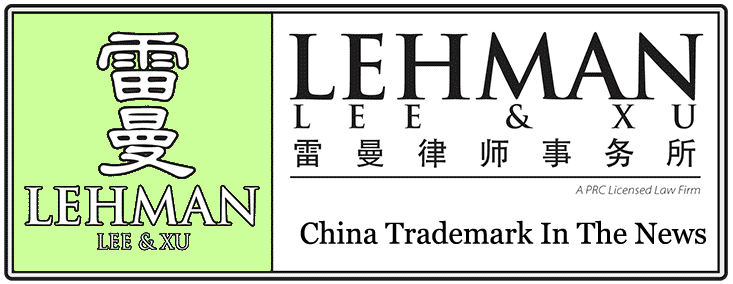
 |
|
LEHMAN, LEE & XU China Lawyer
|
|
China Trademark In The News
|
|
August 2013
|
The China Law News keeps you on top of business, economic and political events in the China. |
In the News |
Second Draft Amendment to China’s Trademark Law Sent to NPC for Review |
After discussions and consultations for nearly 10 years, China’s National People’s Congress finally issued the “Draft Amendment to China’s Trademark Law (hereinafter referred to as the ‘First Draft’)” for public comments on December 28, 2012, with aims at simplifying the trademark registration process, strengthening the protection of trademark rights, and improving enforcement against trademark infringement. On June 26, 2013, a further revision to the country’s Trademark Law (hereinafter referred to as the ‘Second Draft’) was submitted to the Standing Committee of the National People’s Congress for deliberation. The Second Draft proposes to enhance the protection of well-known trademarks, raise the compensation for cases of trademark infringement, and regulate the examination period for trademark registration. Compared to the First Draft, the Second Draft has introduced several key changes as follows: Increasing fines for trademark infringement Specifying the processing period for trademark examination The period for the initial examination for trademark applications shall be no longer than nine months; The period for raising oppositions after the publication of the trademark is three months; The period for investigation and verification shall be no longer than nine months; The period for the Trademark Review and Adjudication Board in reviewing the decisions on rejection an application or refusal of publication rendered by the Trademark Office shall be no longer than six months; and The period for reviewing the opposition case where the Trademark Office finds the opposition is tenable shall be no longer than nine months. However, the above-mentioned periods may be expanded upon approval from the State Administration for Industry and Commerce if special circumstances arise. Prohibiting the exploitation of well-known trademarks Moreover, the Second Draft intends to change the recognition principle of well-known trademarks from “positive identification by batch” to “passive identification on a case by case basis,” meaning the recognition of well-known trademarks shall be conducted by the competent authorities only at the request of a trademark holder in the case of a trademark rights dispute. Removing the provision allowing single colors to be registered as trademarks Establishing a trademark agency blacklist system Trademark agencies shall inform their clients if the trademark they apply for cannot be registered according to relevant laws and regulations; Trademark agencies are not allowed to accept entrustment if they know, or should know that their clients are conducting a malicious registration or infringing upon others’ trademark rights; and Applications and requests filed by trademark agencies that have violated relevant laws and the “good faith” principle in a serious manner may be rejected by relevant authorities. The draft amendments may still need to go through one or more readings before finally being adopted by the Chinese legislators. http://www.china-briefing.com/news/2013/08/06/second-draft-amendment-to-chinas-trademark-law-sent-to-npc-for-review.html
|
|
|
|
|